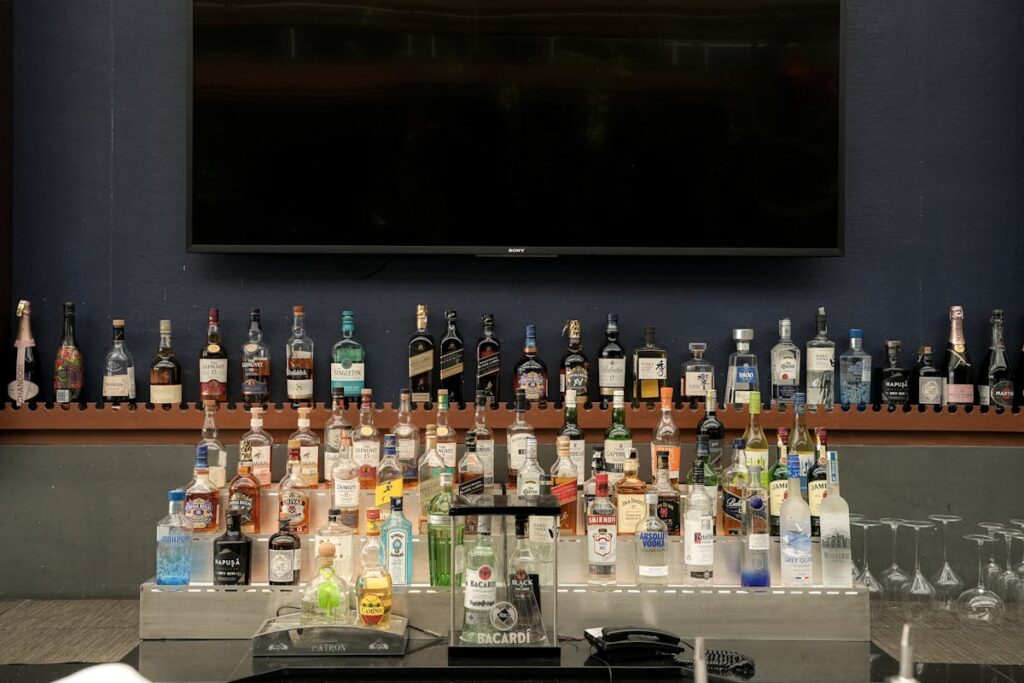Fort Worth Selling Alcohol to a Minor Lawyer

The complexity and gravity of cases involving selling alcohol to minors in Fort Worth necessitate the expertise of a specialized lawyer. These legal professionals, well-versed in Texas liquor laws, provide pivotal support to individuals and businesses grappling with the potential legal consequences of such violations. Their role extends beyond mere representation, encompassing strategic planning, thorough guidance, and vigorous advocacy to secure the best possible outcomes. While the significance of their service is undeniable, one might wonder about the process of selecting such a lawyer and the specifics of their approach.
Understanding Texas Liquor Laws
While Texas is renowned for its vibrant nightlife and rich culture of music and entertainment, it is essential to understand its complex liquor laws to navigate these spaces responsibly. The state’s liquor laws are regulated by the Texas Alcoholic Beverage Commission (TABC) and encompass both aspects of liquor licensing and age verification.
Obtaining a liquor license in Texas requires adherence to a multifaceted process, involving several stages of approval, including local and state levels. The procedure is designed to guarantee that only responsible, law-abiding entities are granted the privilege of selling alcohol. Liquor licensing also extends to cover a range of establishments from restaurants and bars to liquor stores and distilleries.
Age verification, another significant aspect of Texas liquor laws, is stringently enforced. The legal drinking age is 21, and businesses are required to verify the age of customers before selling alcoholic beverages. This is typically done via valid photo IDs. Texas law also stipulates that only persons aged 18 or older may sell or serve alcohol under the direct supervision of a person aged 21 or older in licensed establishments.
Understanding these nuances can help individuals and businesses navigate Texas’ alcohol landscape with legal dexterity.
Potential Consequences of Violations
Violations of Texas liquor laws can result in various legal penalties, ranging from fines to license revocation. However, the impact of such transgressions extends beyond the legal domain, potentially tarnishing the reputation of the business involved, which can have severe long-term consequences. It’s essential to understand these implications fully, not only to prevent violations but also to prepare for possible contingencies.
Legal Penalties for Violations
If you find yourself on the wrong side of the law due to alcohol-related offenses in Fort Worth, understanding the potential legal penalties is essential. Legal definitions categorize the act of selling alcohol to minors as a severe offense, with minor exceptions only applicable under specific circumstances.
Enforcement agencies like the Texas Alcoholic Beverage Commission (TABC) are vigilant, ensuring businesses comply with age verification requirements through regular checks. Businesses are expected to uphold stringent compliance requirements, often necessitating the implementation of training programs for staff to avoid licensing issues and potential violations.
Violation records are meticulously maintained and can lead to severe penalties. An overview of these penalties includes significant fines, suspension, or even revocation of a liquor license, and in some instances, incarceration. The severity of the penalty often depends on the frequency and magnitude of the violation.
The impact of these violations extends beyond the confines of the business; it affects the larger community. Selling alcohol to minors could lead to public safety issues, such as underage drunk driving, contributing to an adverse community impact. Understanding these legal repercussions is critical for any business involved in the sale of alcohol in Fort Worth.
Impact on Business Reputation
Unquestionably, the reputation of a business plays a crucial role in its success, and this is especially true for establishments that sell alcohol. Any violation of legal compliance, such as selling alcohol to a minor, can greatly damage the business integrity, shaking the community trust built over years.
The brand image also suffers, as customer perception may shift negatively. This can result in a decline in patronage, posing a considerable risk to the establishment’s financial stability. Risk management, consequently, becomes critical in such situations. By swiftly addressing the issue and demonstrating responsibility, businesses can attempt to mitigate the damage.
Moreover, such violations can undermine stakeholder confidence, as they may perceive the business as a risky investment. This can lead to reduced financial support, further exacerbating the issues facing the establishment.
Additionally, employee morale can also take a hit. Working for an establishment that does not adhere to legal guidelines can leave employees feeling disillusioned. This might result in higher turnover rates, lower productivity, and potentially even legal issues if employees decide to take action against the establishment.
Importance of a Specialized Lawyer
The role of specialized lawyers in steering through the complexities of alcohol-related cases cannot be understated. Their legal expertise offers significant benefits, including an extensive understanding of the associated laws and potential defenses. This subtopic will explore the importance of such specialization, particularly in handling challenging alcohol-related cases.
Role of Specialized Lawyers
Maneuvering the legal landscape surrounding alcohol-related cases in Fort Worth necessitates the expertise of specialized lawyers. These legal professionals fill a significant role, providing essential legal advocacy and incredibly valuable client support. They are not merely involved in the court proceedings; their responsibilities extend far beyond the courtroom.
Specialized lawyers engage in thorough case analysis, developing a detailed understanding of the case’s intricacies. Their detailed knowledge allows them to strategize effectively, ensuring the best possible outcome for their clients. They navigate the complexities of Fort Worth’s alcohol laws, interpreting and applying them to their client’s advantage.
Client support is another vital aspect of their role. They offer guidance and advice, ensuring that clients are well-informed about their case’s progress and the potential consequences of their actions. This support can be instrumental in alleviating the stress and uncertainty that clients often face during the legal process.
Moreover, specialized lawyers are committed to their client’s rights and interests. They provide unwavering legal advocacy, fighting for justice and fair treatment. Their role is invaluable, shielding clients from potential pitfalls and guiding them through the legal maze. This dedication to their role underscores the importance of having a specialized lawyer when dealing with alcohol-related cases in Fort Worth.
Legal Expertise Benefits
Engaging a specialized lawyer in alcohol-related cases can bring significant advantages. The complexities and subtleties of alcohol laws require extensive knowledge and experience, which a specialized lawyer can provide.
Legal advice from a specialized lawyer is essential in maneuvering the intricate landscape of alcohol laws. This advice extends not only to handling current legal issues, but also to preventing potential future problems. Their in-depth understanding of the laws and regulations allows them to identify potential pitfalls and provide proactive measures to avoid them.
A specialized lawyer can also offer compliance training. Understanding and adhering to alcohol laws is vital in preventing legal issues. Compliance training can help guarantee this understanding and adherence, reducing the risk of violations. It can also be instrumental in establishing proper protocols to handle any potential legal issues that may arise.

Handling Alcohol-Related Cases
Steering alcohol-related cases calls for the keen expertise of a specialized lawyer, a point that builds on our earlier discussion around legal expertise benefits. The complexities of these cases, especially those involving minors, demand an attorney who is well-versed in both the legalities and the social aspects surrounding them.
A key facet of these cases involves youth alcohol policies. Understanding these policies, their implementation, and their implications is essential in effectively representing a minor in court. A specialized lawyer can navigate these policies with precision, ensuring that the rights of the minor are not compromised.
Moreover, a specialized lawyer’s role extends beyond the courtroom. They can become a driving force for community education. By raising awareness about the consequences of selling alcohol to minors, they can contribute to a safer community environment. They can also guide establishments in understanding and implementing alcohol policies, thereby potentially reducing future legal issues.
Selecting the Right Legal Representation
Choosing the right alcohol lawyer in Fort Worth requires careful consideration and thorough research. This process should be underpinned by key factors such as client consultation and attorney qualifications.
The initial client consultation is often a determining factor in the selection process. This is where potential clients have the opportunity to interact directly with the attorney, ask pertinent questions, and assess how well their needs align with the lawyer’s expertise. A consultative approach guarantees that the attorney fully understands the client’s specific objectives and concerns, thereby enabling them to provide tailored legal advice and representation.
Attorney qualifications are another significant factor. It is important to verify that the lawyer is licensed to practice in Fort Worth and has a proven track record of successfully handling alcohol-related cases. The attorney’s educational background, years of experience, and areas of specialization also contribute to their qualifications. Additionally, their reputation within the legal community and reviews from previous clients can provide valuable insights.
Case Assessment and Strategy Development
Once a client’s choice for legal representation is made, the next critical step involves a thorough case assessment and strategy development. This process begins with a detailed case evaluation, designed to gather and scrutinize all relevant facts, evidence, and legal issues. In Fort Worth, selling alcohol to a minor is a grave offense subject to severe penalties. The attorney must meticulously review all the circumstances surrounding the alleged offense, including but not limited to, the credibility of witnesses, the reliability of evidence, and the legality of the procedures that led to the client’s arrest.
Following the case evaluation, strategy formulation begins. It is an intricate process that requires considerable legal expertise and analytical skills. The attorney devises a robust defense strategy based on the strengths and weaknesses identified during the case evaluation. The strategy might involve challenging the validity of the evidence, contesting the methods used by law enforcement, or discrediting the prosecution’s witnesses. The aim is to create reasonable doubt in the minds of the jurors or negotiate a favorable plea bargain. A meticulously planned and well-executed strategy can greatly improve the client’s chances of a positive outcome.
The Court Proceedings Process
Steering through the complexities of court proceedings is a critical phase in any alcohol-related case in Fort Worth. The court procedures for these minor offenses can be intricate, necessitating apt legal representation.
The trial processes commence with jury selection, a pivotal step that can greatly influence the case’s outcome. An experienced lawyer is essential to guarantee an impartial jury. Following this, the evidence presentation phase unfolds. Here, evidence substantiating the charge of selling alcohol to a minor is meticulously examined. A competent defense attorney would scrutinize this evidence for any possible inconsistencies or legal errors.
Defense strategies are then formulated and implemented. These strategies could range from questioning the credibility of witnesses to challenging the legality of evidence or procedural errors. The final verdict, however, rests with the jury, who, after careful deliberation, determine guilt or innocence.
In the event of an unfavorable verdict, appeal options are explored. Appeals require a thorough understanding of legal principles and court procedures, highlighting yet again the need for seasoned legal representation. Maneuvering through the court proceedings process in alcohol-related cases involving minors can be fraught with challenges, but with diligent legal support, it can be effectively managed.
Outcomes and Post-Trial Support
Upon the conclusion of the trial, the verdict sets the stage for the next chapter in the legal journey. The outcome of a case involving selling alcohol to a minor can lead to different paths, contingent on the verdict. Whether the judgment results in acquittal, conviction, or dismissal, each outcome necessitates post-trial support.
Post-trial counseling plays a pivotal role in guiding the accused through the post-verdict phase. This includes explaining the implications of the verdict, possible repercussions, and any potential legal obligations. For those convicted, counseling can also involve advising on coping strategies and rehabilitation programs.
Additionally, in the event of a conviction, appeal options become a significant aspect of the post-trial process. The defense attorney must educate the client on the potential for an appeal, the grounds for appeal, and the process involved. This detailed analysis is critical, as it directly impacts the accused’s decision to pursue an appeal or to accept the verdict.
Frequently Asked Questions
How Long Does a Liquor Law Violation Stay on Ones Record?
A liquor law violation typically remains on one’s record indefinitely. However, possibilities for record expungement exist, varying by jurisdiction. The legal implications of such violations can greatly impact personal and professional opportunities.
Can a Minor Themselves Face Legal Consequences for Purchasing Alcohol?
Yes, a minor can indeed face legal consequences for purchasing alcohol. The accountability of the minor in such situations can result in various legal repercussions, including fines, community service, or participation in educational programs.
Does a Liquor Law Violation Affect Business Licenses or Permits?
Yes, a liquor law violation, such as selling alcohol to a minor, can greatly impact business licenses or permits. The repercussions may include suspension, hefty fines, or even permanent revocation of the liquor license.
Are There Different Laws for Selling Alcohol to Minors Online Versus In-Store?
Yes, laws can differ for online versus in-store alcohol sales to minors. Online regulations may involve ID verification systems, while in-store enforcement typically includes mandatory ID checks at the point of purchase.
What Are the Typical Legal Fees Associated With an Alcohol to Minors Violation Case?
Typical legal representation costs for an alcohol to minors violation case vary widely, depending on the complexity, defense strategy options, and attorney’s experience. Fees can range from a few hundred to several thousand dollars.

